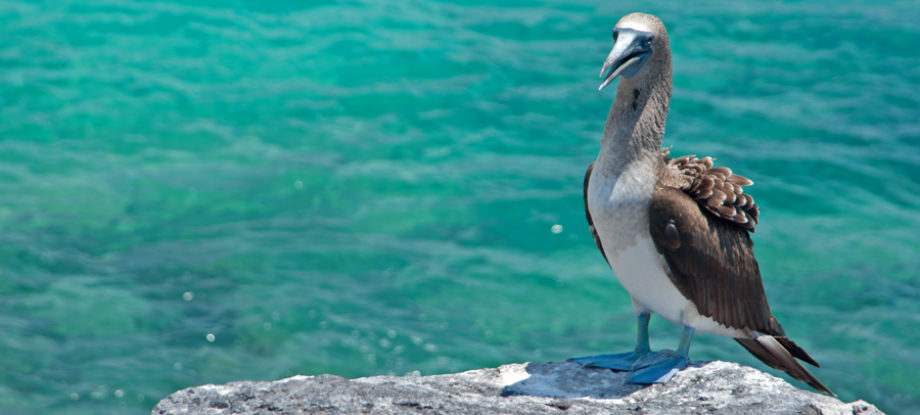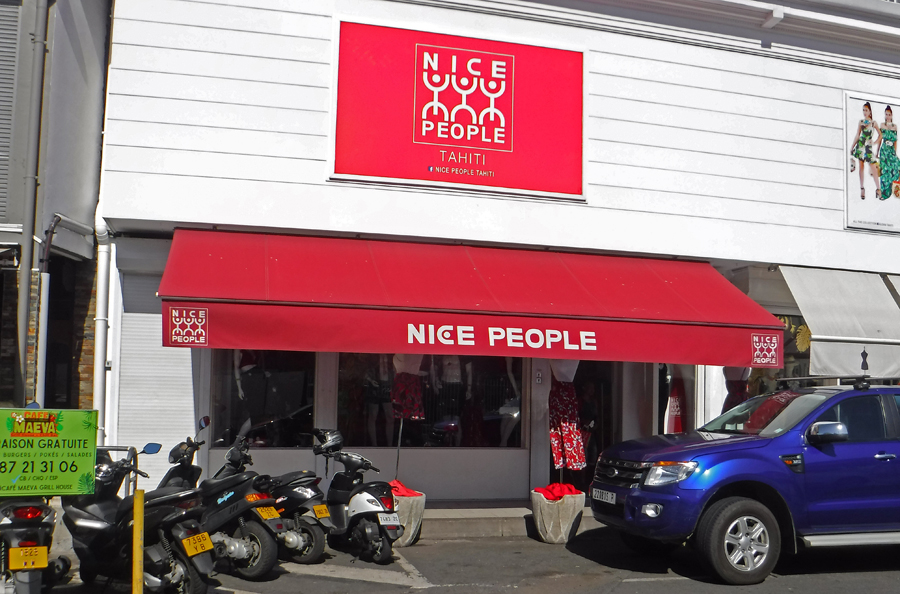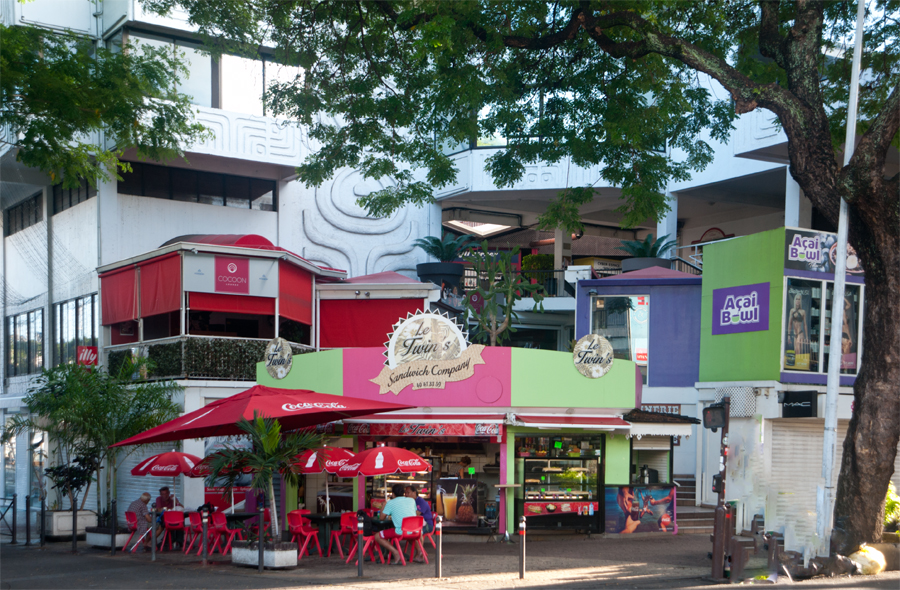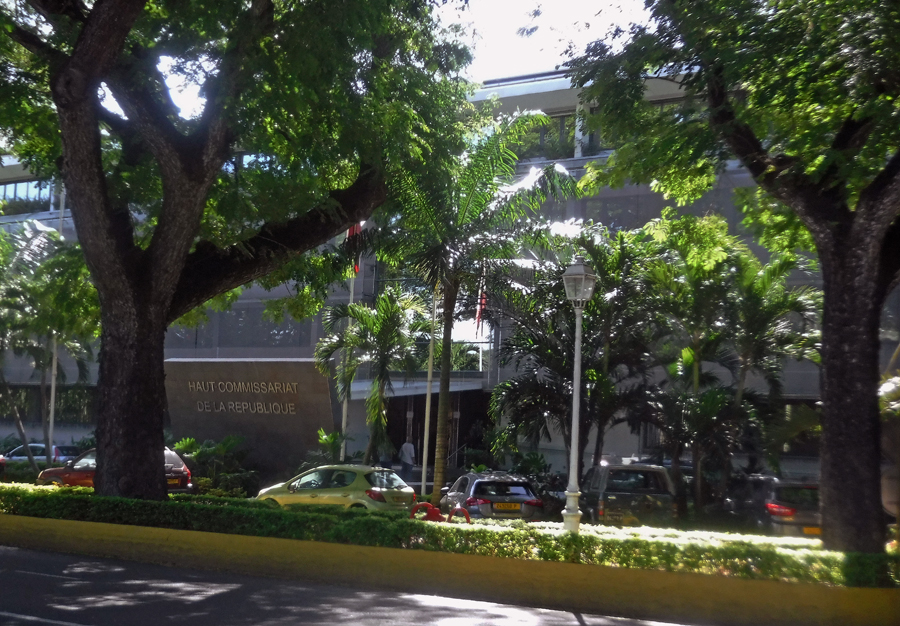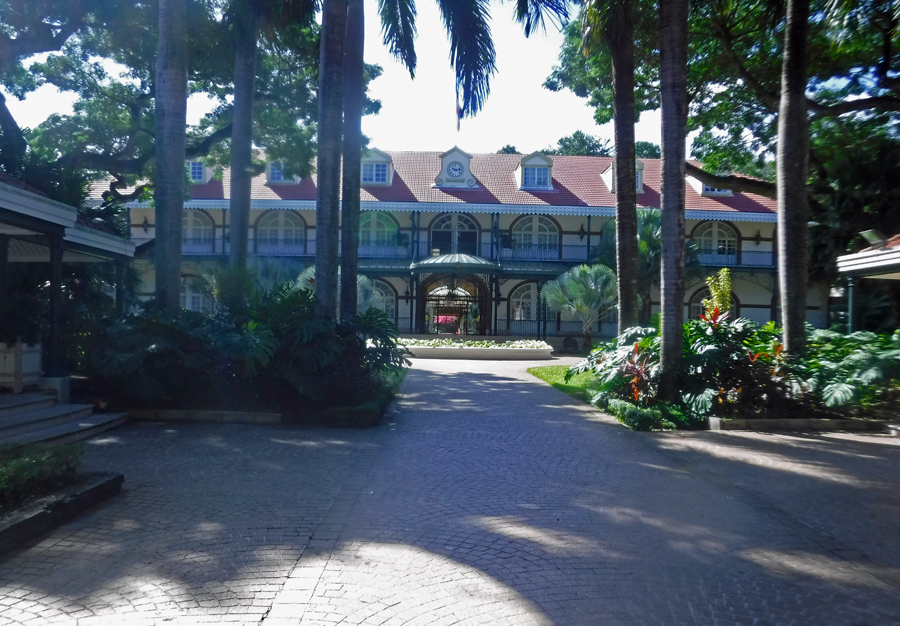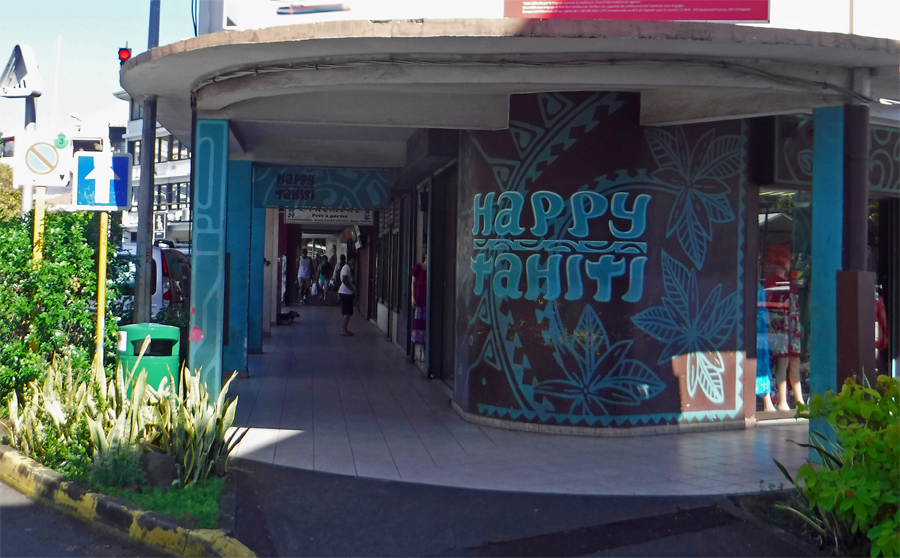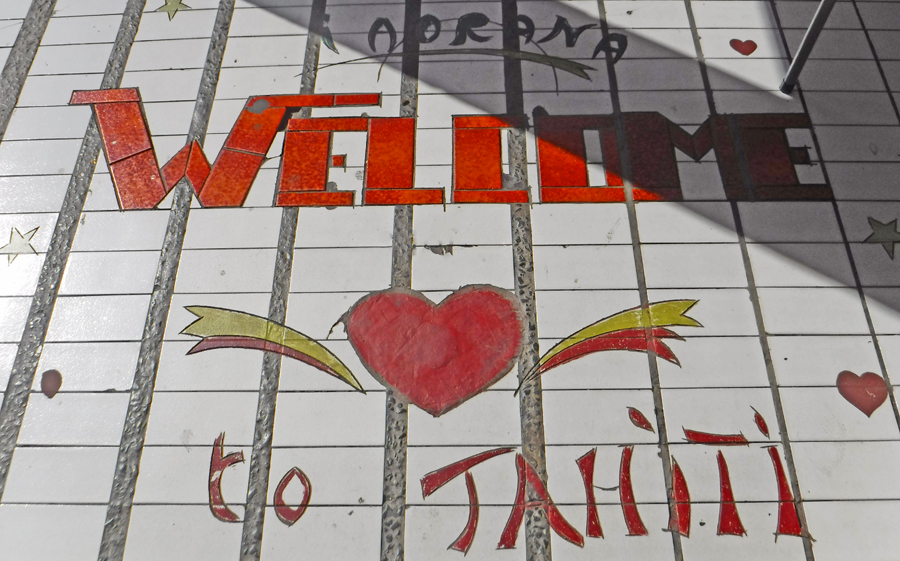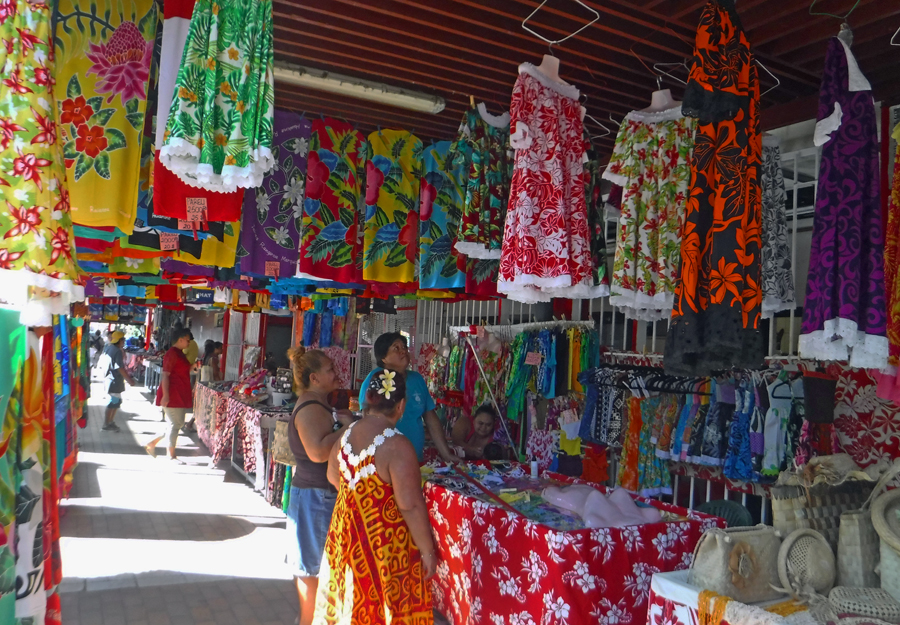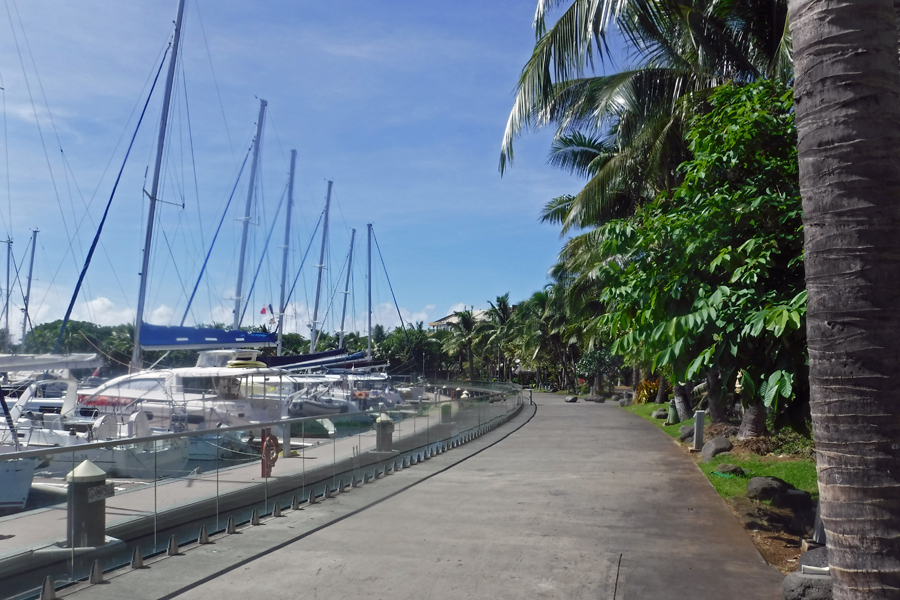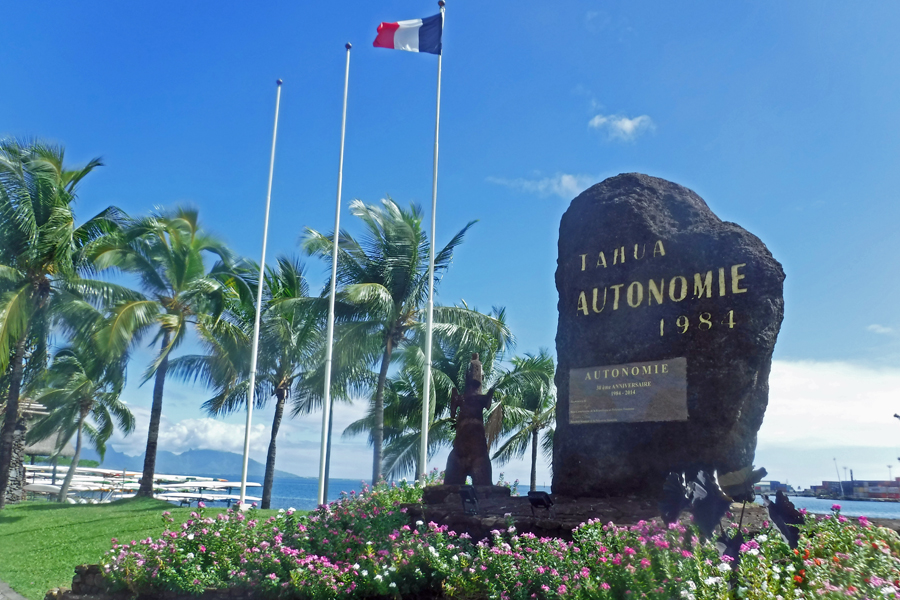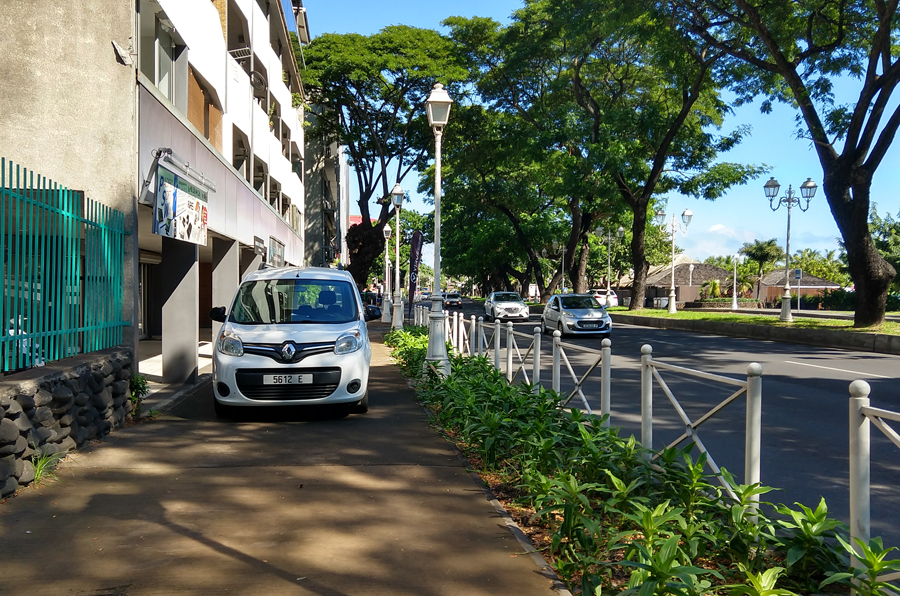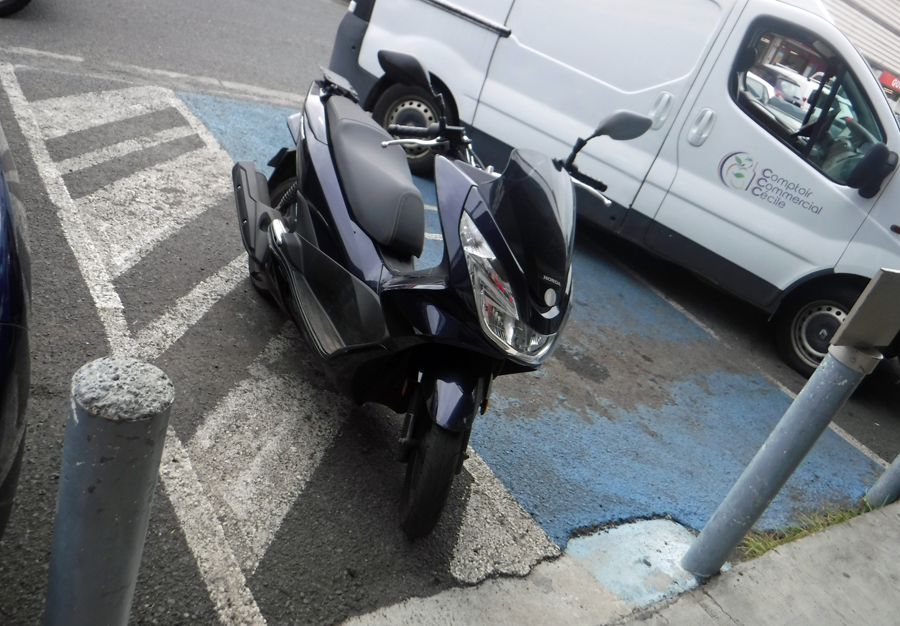C’est la vie. (That’s life)
This blog is known for sharing the sunny side of cruising and the sometimes not so sunny side. This is one of those not so sunny sides. Well, it is and it isn’t. Our view of French Polynesian remains cheerful. Others here are starting to hate it. You can judge for yourself.
It is upsetting to me how we now have to be careful about who we hang out with in Tahiti. There are some hot topics here, mainly visas and anchoring. Some cruisers have very strong opinions. Unfortunately, the mindset seems to be the loudest person wins. Given the choice, we spend our time with people in agreement that the islands are beautiful and the people are friendly. This is not always easy. And, believe it or not, some people take a hostile and offensive approach toward our cheerful view of French Polynesia.
For a cruiser to arrive in French Polynesia with only a 90-visa option is extremely optimistic. To arrive in French Polynesia from the Americas is about a 3,000-mile sail or more depending on the departure point. To cross French Polynesia, an area the size of Europe, also takes considerable time. Obviously, if a person stops to enjoy the islands and atolls along the way, it is going to take longer still. To think nothing is going to go wrong with the boat or the people aboard the boat to cause a delay is, in my opinion, not very good planning.
From day one, once we decided to cross the South Pacific, staying in French Polynesia for more than ninety days was always the consideration. If we arrived here and did not like it, we could always move on. Like that was ever going to happen. French Polynesia has an option for cruisers (and everyone else). It is a fantastic system allowing people to stay in the country for extended periods without having to leave and return. Most other countries do not offer visa extensions and require visitors to leave before the visa expires; usually, the expiration is sixty to ninety days. Some counties allow people to turn around and immediately re-enter, others require people to remain elsewhere for a specified time before re-entry is allowed.
The visa system here is much better than the leave and return option. French Polynesia allows people to apply for a long-stay visa (LSV). The rules are pretty simple for citizens outside of the European Union. It is a requirement to apply for the LSV at a French embassy before arriving in French Polynesia. Among other things, there are forms to fill out and a person must prove they can support themselves and maintain health insurance during their stay. The process for a LSV can take up to four weeks. During this time, they will hold your passport unless you are in a country such as Panama where it is a requirement for tourists to carry their passport at all times.
Upon arrival in French Polynesia with the LSV, an application for a Carte de Sejour (CDS) is made. Most people do not realize this but, it is a residence permit. It is valid for one year from the date of application and is renewed each year. So long as you behave yourself on the islands the renewal each year is pretty much always granted. This is a much better process of having to leave and return, especially since leaving requires long sails to other countries in directions where winds are unfavorable. So why don’t people do this?
Cindy did all of our paperwork and handled the LSV and CDS. She is very good at detailed processes. I am not. Today, when I ask her how hard it was, she says it was not difficult so long as the detailed instructions are followed to the tee. Our application required three trips to the French Embassy in Panama City.
The trip to the French Embassy can be a hassle. For us in Panama, we made the most of it. We stayed downtown Panama in an awesome hotel the night before our appointment, enjoyed a wonderful evening and dinner in the city. Then, we took care of business the next day. Yes, there are costs involved; the cost of getting to the embassy and the cost of the LSV – about US$115 each. Filling out the forms requires some time. Having to purchase a health insurance policy for those who travel without can add an additional $300-700 to the cost. Being without a passport and having to pay some fees are the drawbacks cruisers mention most when opting to forgo this process.
In French Polynesia currently, there are some cruisers who opted not to apply for an LSV. The process cannot be started once arriving on the island (except for some EU citizens). It must be completed before setting foot here. This is the law. The optimism of these cruisers to pass through in ninety days was shattered by the arrival of Covid-19. Countries west of here closed their boarders leaving cruisers no options for exit. Sailing back east is not an option as the tradewinds are unfavorable.
Early in the Covid-19 era, French Polynesian authorities repatriated all tourists from the islands. After this, the airport was closed for all commercial inbound and outbound flights. The repatriation did not apply to private yachts since it was understood the occupants would eventually leave aboard the yacht on which they entered. However, this was not always the case. As islands west offered no options, some people had to leave their boats here and prior to their 90-day visa expiring depart the island via repatriation charter flights. This often involved a huge expense and multiple stops to return to their home country. The boats are allowed to stay up to three years before an import tax is levied.
As these cruisers are finding out now, the cost and hassle of obtaining an LSV and CDS are considerably less than having to pay their way out of the country on a charter flight. And, once they are out they must remain out for ninety days. French Polynesia allows stays up to 90 days in a 180-day period with a standard visa. Even if the islands open for tourism, they may not be allowed to return immediately. It depends on their cumulative days in French Polynesia and the time outside. I recently read this may change but as of this post, the requirements are as previously stated.
Unfortunately, the visa rules have caused some people here to broadcast very negative opinions about French Polynesia. They are angry because they have to leave. My empathy level is low for their situation. While I agree nobody knew the virus was coming, I still hold firm the optimism to cross this country in 90-days without a plan for a delay is a little myopic. Obtaining an LSV was available to all these sailors. Had they procured one, their situation today would be completely different.
We had conversations with another couple who were up against their visa expiration deadline. I use the word conversation lightly since it was really not that at all. It was more like they vomited all of their issues on us. We tried to offer some advice on things we would do if in their situation but it fell upon deaf ears. Toward the end of the conversation, we remained quiet and secretly wanted them to leave us alone. All they desired was to be angry and vent their anger on others.
“If we stay past our visa expiration, what can they do to us?” Seriously? This was an option they threw out. Impounding the boat, levying fines, deportation, and jail are some of the things quickly energizing the little grey cells in my head. I quickly reminded them how their own country treats people who stay past their visa expirations. It is not a warm and fuzzy approach. This did not go over well.
We have heard phrases like, “The French just hate Americans here”. There is no question the policies of the USA do not sit well outside of the States. Examples being: America First, withdrawal from the Paris agreement (an agreement reached by almost all countries on the planet to combat climate change), withdrawal from the Iran Nuclear Agreement (which was strongly supported in Europe), and most recently the withdrawal of all funding to the World Health Organization (WHO) amid a global pandemic. Even with all of this, we have not witnessed any hatred toward Americans. Considering the bulk of tourism in French Polynesia comes from the USA, we have found the complete opposite to be true. The government is well aware of where the tourism revenue comes from and has a history of welcoming Americans. Many people have taken the time to learn a second language so they can work in the tourism industry. They love to practice their English with us. We try to learn a couple of new French words from them. Would they do this if they hated the American tourist?
We hear phrases like, “The French Polynesian government doesn’t want us here”. This couldn’t be further from the truth. I think the government has gone out of its way to keep borders open long enough for yachts in transit to the islands to timely arrive. They have allowed anchoring in parts of the island where anchoring is normally prohibited due to the large number of boats stuck here. They have allowed sailors ashore during Covid-19 regulations. Even once the borders closed, the government still allowed passing boats to stop for fuel and food (crew members could not go ashore). The Government just asks people to follow the rules.
An attitude expecting French Polynesia should adapt to an outsider’s needs or change the laws immediately to accommodate a few individuals doesn’t sit well with us. And, I am guessing it doesn’t sit well with the authorities. Because of these attitudes, Cindy and I are being selective about who we share our time with. This bothers us immensely since we are normally very open to people, their views, and will offer support where we can. I am getting rather tired of hearing negativity and disgust of all things Polynesian because a person failed to plan ahead. I despise having to be picky about our company but, people without an LSV are becoming disrespectful toward people with an LSV.
Americans have the option of sailing to Hawaii, about 14-days away. All international boaters have the option to sail to Hawaii since it is still one of the few places on the globe open to international yachts. But once there, the USA visa process for foreigners can be an absolute nightmare. Am I the only person who sees the irony in this as Americans complain about French Polynesia’s visas?
Many Australians and New Zealanders are trying to get home. They are waiting here in the hope some islands open making their trip more comfortable by having places to stopover along the way. It is a waiting game for these sailors. Which is going to happen sooner; will an island open or will the visa expire? It is sad these boaters might have to skip most of the South Pacific stops if the borders remain closed. The clock is ticking as they need to time their exit before cyclone season or their visa expiration. But, again an LSV would allow them to stay until next year, budget and insurance allowing. Having access to Australian and New Zealand is good for the citizens of these countries but the borders remain closed to non-citizens.
In addition to the moaning and groaning about visas, on Tahiti, there is a lot of hoopla regarding new anchoring rules. This has many of the cruisers visiting here shuffling their boats around to comply. The rules were pending for some time but due to the virus and the directive that no boats were allowed to sail between islands or move once at an island, the ruling was shelved for the duration of the virus restrictions. Now with restrictions lifted, a large portion of the northwestern part of Tahiti has a ban on anchoring. Well, there is sort of a ban. I need to give you a little background.
Local businesses and restaurants cited cases where they found cruisers doing laundry in their public bathrooms, dumping trash in private dumpsters (and on the street), stealing water, and pirating Wi-Fi from the restaurants and marinas. We have seen it everywhere we’ve traveled. Unfortunately, there is an element in our community that thinks this is acceptable behavior. According to our new friends who have been here for three years, this escalation has been ongoing. It finally peaked and an anchoring ban near these businesses came into effect for a small area of Tahiti. However, the ban was not enforced since the virus hit and it was recognized the area was getting crowded and boaters needed a place to stay. During the virus, many boaters (including us) were directed to Tahiti and told to stay.
Another decree was drafted after several locals complained about the large number of boats anchored in an area where locals often frequent for water sports. This is referred to as the airport anchorage. This was on top of the continued complaints from local businesses adding more fuel to the fire. The decree stated all anchoring was banned in the areas between the Pape’ete Marina and Marina Taina, pretty much all the northwest of Tahiti. It stated boats could only use moorings in this area. A mooring field already exists near Marina Taini but the big catch being, the airport anchorage has no moorings. If the plan was to install mooring, this wasn’t stated.
If you are reading between the lines here, you probably have already noted how I’ve mentioned marinas and mooring fields. So, while there is a proposed ban on anchoring, boats are not without other options. In addition to the mooring field by Marina Taina and the two marinas, vessels are free to anchor elsewhere on the island. Places such as Phantom Bay are wide open. Tahiti has a fabulous bus system and a cruiser can be in downtown Pape’ete in 30-45 minutes from this bay for about US$5.00 round-trip. A great grocery store is a short ride on a bus. So why are people griping about all of this? Well, it’s inconvenient to anchor elsewhere or it’s going to cost some money for a mooring or marina. This is the bottom line.
Once again and very unfortunately, some loud boaters have taken to social media stating how the French Polynesian people do not what cruisers here because of the anchoring restrictions. I think some cruisers forget it is not their island and the government, in response to their constituent’s requests, has every right to restrict anchoring. We are guests here and I feel fortunate to have the opportunity. It is very sad the anti’s feel the need to speak on behalf of the cruising community as the vast majority of us do not agree with them. All of the French Polynesian people, and I mean all of the people, we have met here so far have exhibited nothing but warmth toward us. Needless to say, when the boaters start to insult the locals on social media, the rift deepens. In areas where moorings are installed, such as almost the entire BVI or Bonaire, they work well. The coral and seabed are protected from anchors, the locals understand there will be boats on these moorings and not in other areas. It is a good solution. Some cruisers are already complaining about fees and they don’t even know how much they are going to charge.
Cindy and I prefer to stay in a marina when possible. It is easier to meet people, we don’t have to commute everywhere by dinghy, we can step off the boat and enjoy local restaurants, we can easily go for walks, I can pop out to the bakery in the morning for fresh warm croissants, and we have air conditioning. Once we saw restrictions easing it made sense to grab a slip downtown and enjoy Pape’ete. We initially anchored since it made no sense to go to a marina only to be quarantined to the boat because of Covid-19 restrictions. The easing of the restrictions sealed our decision. We were in a restricted area and some nice local patrol guys let us know we may have to move once the restrictions eased. They were polite and friendly. We thought the last thing we need is to be in the middle of a cruiser/local hostility.
Cruisers do add value to the local economies. We shop in marine and hardware stores, hire people to work on our boats, and occasionally dine out. However, the money we spend as a group is a drop in the bucket compared to the remainder of the tourism normally here. Think about the vast number of people who disembark a single cruise ship in port and the money spent in the local shops. This happens day after day after day. Also, think about people arriving by plane and staying in hotels and dining out. Room and board for these folks could easily exceed US$500 per day here. These people normally arrive by the full planeload. Cruisers do not commonly spend anything close to these tourists. A somewhat adversarial response to the anchoring restriction was to wave in the face of the French Polynesian authorities how much cruisers spend while here and how they are the only source of tourism dollars right now. I laughed hard when I read this. The irony is the cruisers claiming they help the economy are the ones wanting to anchor for free and spend the least amount of money they possibly can.
A little while back, a well-known person in the cruising circle posted on FaceBook an alternative route to cross the South Pacific avoiding all of French Polynesia. They did this during the onset of discussions regarding anchor restrictions. When I read this, I was amazed someone could be so shortsighted. Why on earth would a sailor cruising about the globe want to avoid an area the size of Europe because of anchoring issues on a couple of islands out of the hundreds in the country? Was this done in satire? Who knows? Seriously, we are talking about a couple of small bays in hundreds of islands. Posting such negativity creates rifts and accomplishes nothing. Sarcastically, I hope the boycotters do skip the islands, more room for us, and less negativity.
Then, the most comical thing happens. The President of French Polynesia speaks about Covid-19 rules being relaxed. In his speech, he says it is time for sailboats to continue on their journey and open up the bays for the local use. I’m not sure where he expects boats to go since no country west of here is open to non-citizens yet. It is an election year. Perhaps he needs the votes. A handful of local people are demanding action. I have a feeling he is trying to appease them. DPAM, the overseeing agency releases a document explaining the new restrictions. The local police tell boats they need to move. We all think, “This is it. The anchoring ban is now official.” But after all of this hoopla, the decree is not signed into law and disappears from the DPAM website. Nothing further was said. Poof! The anchoring restrictions are gone. The damage done by the hostilities on both sides remains. No doubt, the issue hasn’t completely vanished. This saga will continue. [Update since I wrote this: the new anchoring rules came into effect]
To end this on a funny note, during all the anchoring bans and parking of boats we have noticed something. The focus of illegal parking by the officials seems to be looking toward the oceans and surrounding reefs. They are dealing with loud complaints from a small handful of locals. However, if the governing officials turned around and looked inland, they would find driving and parking on the sidewalk seems to be perfectly acceptable. Handicap parking spots really mean parking for motorcycles. Park anywhere seems to be the motto of Tahiti. C’est la vie.
